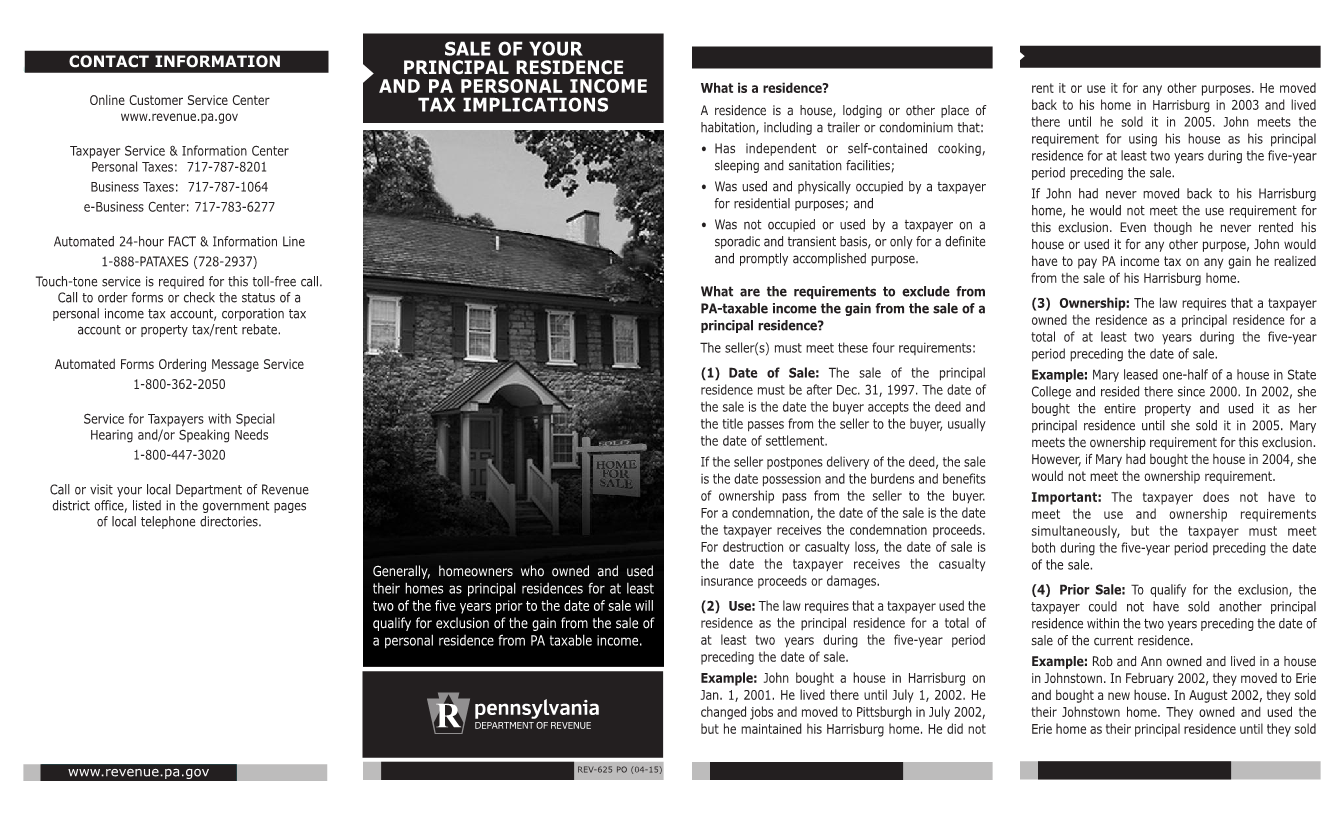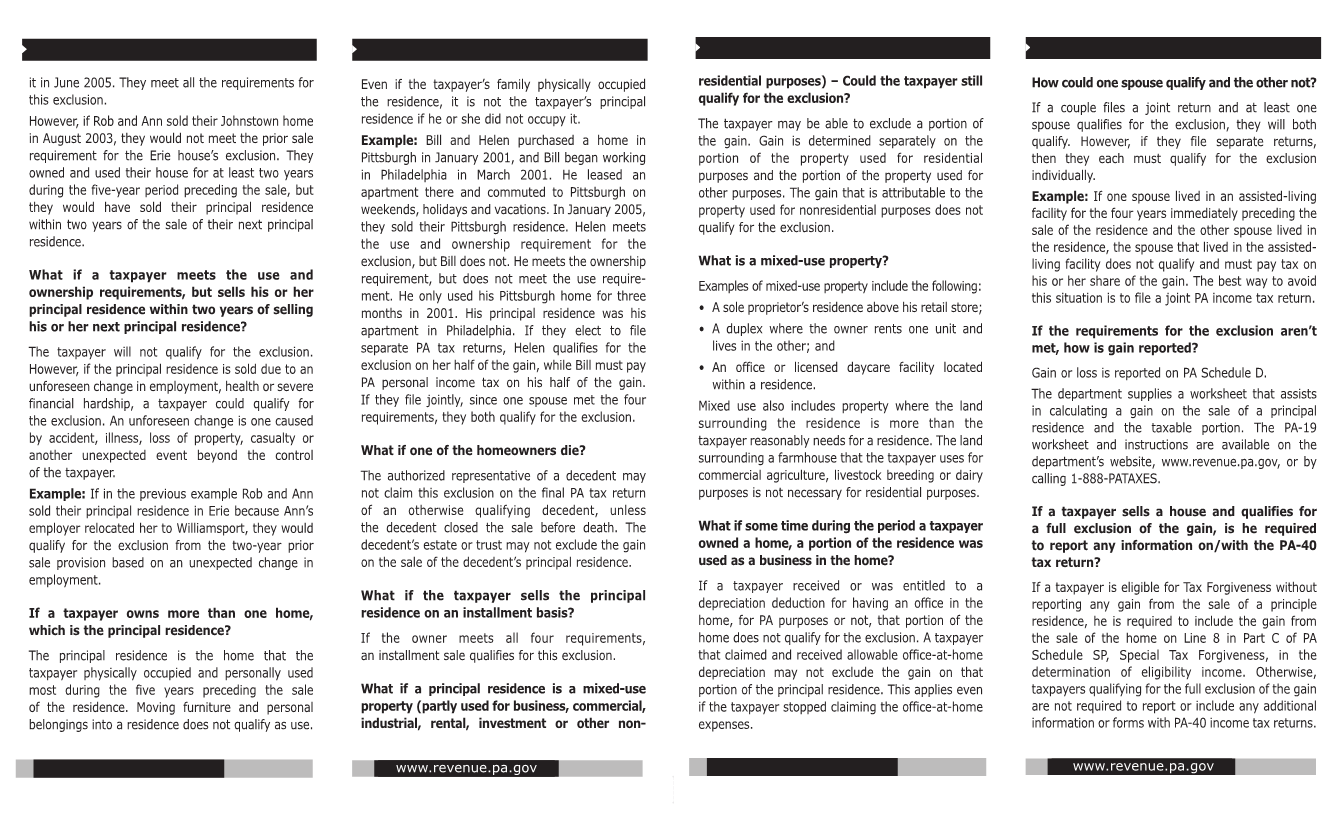
Enlarge image
SALE OF YOUR
CONTACT INFORMATION
PRINCIPAL RESIDENCE
AND PA PERSONAL INCOME What is a residence? rent it or use it for any other purposes. He moved
Online Customer Service Center TAX IMPLICATIONS A residence is a house, lodging or other place of back to his home in Harrisburg in 2003 and lived
www.revenue.pa.gov habitation, including a trailer or condominium that: there until he sold it in 2005. John meets the
requirement for using his house as his principal
Taxpayer Service & Information Center • Has independent or self-contained cooking,
residence for at least two years during the five-year
Personal Taxes: 717-787-8201 sleeping and sanitation facilities;
period preceding the sale.
Business Taxes: 717-787-1064 • Was used and physically occupied by a taxpayer
If John had never moved back to his Harrisburg
e-Business Center: 717-783-6277 for residential purposes; and
home, he would not meet the use requirement for
• Was not occupied or used by a taxpayer on a this exclusion. Even though he never rented his
Automated 24-hour FACT & Information Line sporadic and transient basis, or only for a definite house or used it for any other purpose, John would
1-888-PATAXES (728-2937) and promptly accomplished purpose. have to pay PA income tax on any gain he realized
Touch-tone service is required for this toll-free call. from the sale of his Harrisburg home.
Call to order forms or check the status of a What are the requirements to exclude from
PA-taxable income the gain from the sale of a (3) Ownership: The law requires that a taxpayer
personal income tax account, corporation tax principal residence? owned the residence as a principal residence for a
account or property tax/rent rebate.
total of at least two years during the five-year
The seller(s) must meet these four requirements: period preceding the date of sale.
Automated Forms Ordering Message Service
(1) Date of Sale: The sale of the principal Example: Mary leased one-half of a house in State
1-800-362-2050
residence must be after Dec. 31, 1997. The date of College and resided there since 2000. In 2002, she
the sale is the date the buyer accepts the deed and bought the entire property and used it as her
Service for Taxpayers with Special the title passes from the seller to the buyer, usually principal residence until she sold it in 2005. Mary
Hearing and/or Speaking Needs
the date of settlement. meets the ownership requirement for this exclusion.
1-800-447-3020 If the seller postpones delivery of the deed, the sale However, if Mary had bought the house in 2004, she
is the date possession and the burdens and benefits would not meet the ownership requirement.
Call or visit your local Department of Revenue
of ownership pass from the seller to the buyer. Important: The taxpayer does not have to
district office, listed in the government pages
For a condemnation, the date of the sale is the date meet the use and ownership requirements
of local telephone directories.
the taxpayer receives the condemnation proceeds. simultaneously, but the taxpayer must meet
For destruction or casualty loss, the date of sale is both during the five-year period preceding the date
the date the taxpayer receives the casualty of the sale.
Generally, homeowners who owned and used
insurance proceeds or damages.
their homes as principal residences for at least (4) Prior Sale: To qualify for the exclusion, the
two of the five years prior to the date of sale will (2) Use: The law requires that a taxpayer used the taxpayer could not have sold another principal
qualify for exclusion of the gain from the sale of residence as the principal residence for a total of residence within the two years preceding the date of
a personal residence from PA taxable income. at least two years during the five-year period sale of the current residence.
preceding the date of sale. Example: Rob and Ann owned and lived in a house
Example: John bought a house in Harrisburg on in Johnstown. In February 2002, they moved to Erie
Jan. 1, 2001. He lived there until July 1, 2002. He and bought a new house. In August 2002, they sold
changed jobs and moved to Pittsburgh in July 2002, their Johnstown home. They owned and used the
but he maintained his Harrisburg home. He did not Erie home as their principal residence until they sold
www.revenue.pa.gov REV-625 PO (04-15)
